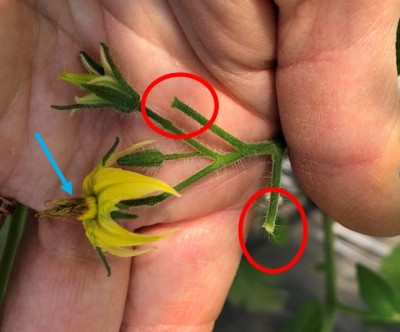Blossom Blast and Bumblebees
Amy Ivy, Vegetable Specialist
Eastern New York Commercial Horticulture
There are a variety of reasons why blossoms might blast on tomatoes. Blast is a dramatic term for when the blossoms die and fall off before fruit can set. Temperatures over 95, manganese and zinc deficiencies, and pepMV virus are all possible causes. Some plants even do some self-thinning and shed blossoms when their fruit load is too great. But this week was the first time I had heard of the concept of over-pollination, and it seems several growers are having trouble with this in their early, heated high tunnel tomatoes.
Bumblebees are ‘buzz pollinators,' meaning they shake the pollen out of the anthers by buzzing. They bite onto the anthers and then vibrate their bodies to shake loose the pollen. For an amazing video clip of how this works visit: https://www.youtube.com/watch?v=SZrTndD1H10 . Growers with heated tunnels can start their tomatoes extra early but they need to buy in bumble bees to pollinate since the native ones are not yet active.
Usually this process works fine but sometimes there are more bees than flowers and the hungry bees come back to the same flower multiple times, trying to shake more pollen loose. Too much of this aggressive feeding can kill the flowers (see photos).
One grower estimates he has lost half of all of his first flower clusters, a loss of about $2400, so this damage can be serious. The bee supplier has renamed its product line this year and most of our growers are ordering the ‘start-up' hive. But this hive was developed for high volume hydroponic producers in mind and has more bees than usual. I visited three growers with this problem this week and we would be very interested to know how many others are having this problem. Please call, text or email me (adi2@cornell.edu or 518-570-5991).
Photo: Notice the darkened anthers (blue arrows) and the dropped blossoms (red circles). A little bit of darkening is tolerable but the flowers will drop if this much damage occurs.
This article is from the April 26, 2018 edition of ENYCHP Vegetable News. To read the full newsletter, CLICK HERE.


Upcoming Events
I thought I was covered for that! Farm Insurance Webinar Series, Jan-Feb 2026
January 13, 2026 : Session 1: Insurance and Risk Management 101
Insurance and Risk Management 101. This first webinar will cover many of the general provisions found in insurance policies and describe some of the terms to be aware of when you are considering your options. Steve Hadcock, Capital District Hort Team and Greg Murk, FarmNet.
January 20, 2026 : Session 2: Liability Insurance
Coverage for the risk that your business will cause harm to someone. Are you having people on your farm or selling a food product? You might need liability insurance. Robert Hadad, Cornell Vegetable Program, Elizabeth Higgins, Eastern NY Commercial Hort Program.
January 27, 2026 : Session 3:Protecting Yourself from Disasters (Crop Insurance, USDA FSA programs and Flood Insurance)
Are you protected from a weather event on your farm? Learn about your options for Disaster Coverage (crop insurance, FSA programs, flood insurance). Elizabeth Higgins, Eastern NY Commercial Hort Program.
February 3, 2026 : Session 4: Insuring People (health, life and disability insurance)
Options for health insurance, life insurance and disability insurance, and how they can help farmers and their employees. Maire Ullrich, CCE Orange County and Lucas Smith, Cornell Ag Workforce Development
February 10, 2026 : Session 5: Property Insurance
Insuring your infrastructure, equipment, and livestock from loss. Learn about the types of coverage, and the risks they reduce. Colin Hostetter, Tri-County Ag Team, Desiree Keever, CCE Delaware County and Steve Glick, Kevin Daniels Agency.
How to Diversify or Scale Up with Confidence for Profitability - Inspired by Annie's Project
February 4, 2026
February 11, 2026
February 25, 2026
Do you have an idea for a new enterprise to add value to your farm? Maybe you're considering scaling up for a potential market opportunity but just aren't sure if it's a good fit for your business. Join Cornell Cooperative Extensions of Allegany County, Broome County, Madison County, Onondaga County, Niagara County, Tioga County, the Niagara Small Business Development Center, and the Eastern NY Commercial Horticulture Team for a hybrid series on Wednesdays in February, starting on February 4th that will answer these questions and more. Annie's Project seeks to empower farm women through education, networks and resources. We welcome, and encourage, learning and sharing amongst farm women as we help you grow as decision-makers and leaders on your farm.
2026 Northeast Extension Fruit Consortium Winter Webinar Series
February 4, 2026 : Management of Up and Coming Strawberry Diseases in the Northeastern United States
Session 1: Management of Up and Coming Strawberry Diseases in the Northeastern United States
February 11, 2026 : Kiwiberry Production in the Northeast
Session 2: Kiwiberry Production in the Northeast
February 18, 2026 : Heat Mitigation- Sunburn and Fruit Coloring
Session 3: Heat Mitigation- Sunburn and Fruit Coloring
February 25, 2026 : The Dating Game- Updates in Lepidopteran Mating Disruption
Session 4: The Dating Game- Updates in Lepidopteran Mating Disruption
March 4, 2026 : USEPA Endangered Species Act Strategies and Pesticide Use
Session 5: USEPA Endangered Species Act Strategies and Pesticide Use
March 11, 2026 : Practical Drought Management for Fruit Growers
Session 6: Practical Drought Management for Fruit Growers












































